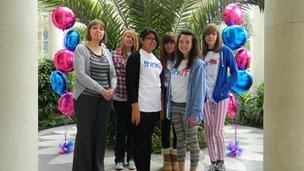Women and tech: Why don't girls want to be geeks?
- Published

The image of the geek still lingers
Last month Yahoo appointed a self-styled "super geek" as its chief executive. Nothing unusual there - except this one was a woman and a pregnant one to boot.
While female tech bosses like Marissa Mayer aren't quite as rare as hen's teeth, her appointment generated far more headlines than a man's would have.
So why when technology is becoming increasingly desirable, is there little desire to work in IT, especially for girls?
In the UK, 84% of IT professionals are men.
Many companies want more women involved - in a survey conducted by IT recruitment company CW Jobs, 64% said more females in the workplace would be beneficial.
"There is this conception that IT is men with long hair sitting in air-tight rooms programming all day," said the company's website director Richard Nott.
Java club
This image problem starts at school, according to one teacher.
"Girls don't see IT as creative. It is that image of the geek or nerd in a room typing lines of code," said Peter Mapstone, head of IT at King Edward VI school in Hampshire.
Gender differences become apparent during IT lessons, even though there is no difference in ability, according to Carol Dawkins, an IT teacher at Toynbee School in Chandlers Ford.
"Boys are more, 'Game on' - they don't mind if they make mistakes. They are more confident around the technology, whereas girls are a little bit shy, on the back foot before they start," she said.
The point is perfectly illustrated by Toynbee's after-school Java club - only boys have signed up.
"For the boys, hacking Linux is their comfort zone - whereas for girls, technology is all about email and Facebook," said Mrs Dawkins.

Girls tend not to choose technology or maths-based careers
When IBM's master inventor Mandy Chessell was at school, she said she had "missed the memo which said that girls don't do maths and science".
But she had a rude awakening when she joined her classmates in her first O-level lesson and realised she was the only girl.
Now working at IBM's Hursley laboratory, Ms Chessell has long since got used to working in male-dominated environments.
It hasn't held her back - she is now one of IBM's few senior female engineers and recently won the Cisco Women In Technology award.
And she is clear about the need for women at senior levels in technology firms.
"You can become a leader and you can lead in feminine ways," she said.
For her, this means a greater emphasis on collaboration.
"For junior technology roles, often the emphasis is on logical skills, which may put girls off, but most systems these days are put together as part of team effort," she said.
IBM has a series of projects aimed at encouraging girls to take more science, technology, engineering and maths (Stem) subjects.
The BBC took part in its Think IT workshop in July, where 100 girls aged 12 and 13 came to IBM's lab to find out more about how a technology product comes to market.
The girls were divided into teams, each named after a famous female technologist or scientist, and asked to come up with a new piece of sport technology, from apps through to running shoes.
IBM has reaped some rewards from the scheme - several girls that have been through the programme have gone on to become apprentices at the firm.
Indeed the girls on the course seemed fired up by what they were doing, but none wanted to take it to exam level.

IBM runs events to encourage girls to consider a career in technology
Interestingly, few felt that ICT was a difficult subject, some actively enjoy it, but none of those the BBC spoke to wanted to pursue it as a career.
"I enjoy it, but I don't want to do it as a job," said Carys, aged 13.
But it isn't down to lack of confidence in the subject. "We are better than the boys," said one girl bluntly.
Ruth Amos, now 23, won a young engineer of the year award when she was 16.
For her, it was a gradual realisation that engineering didn't have to be about dirty overalls.
"I realised that I could do it and wear a dress and nice shoes and still be me," she said.
She believes Stem subjects need a higher profile in the media.
"It really upsets me when I see girls watching shows like The Only Way is Essex and aspiring to be like that. Why not give that air time to inspiring them about Stem? Look at what The Apprentice and Dragon's Den have done for entrepreneurs." she said.
Recently she has taken part in Soapbox Science, a project where women in technology, engineering and science literally take to soap boxes on London's south bank to evangelise their chosen careers.
But she thinks the discussion about why girls don't want to be geeks will continue for a while.
"We have been talking about it for ever and, while things are changing, it is very gradual," she said.
Yahoo's new boss Marissa Mayer has promised to address the issue of too few women in the tech industry, but she may face a tough job.
Last month Microsoft had to apologise when a chunk of code emerged labelled "big boobs".
There is clearly some way to go.